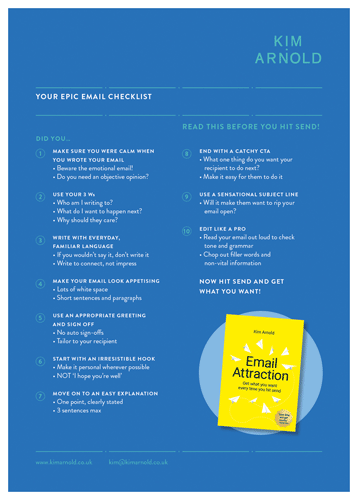So my good friend and work buddy Esther Stanhope and I were chatting this week.
‘Credibilise – is that a word?’ she asked.
‘No, but it should be,’ I replied.
‘Well, that’s what I do every week with my newsletter,’ she went on.
‘After I’ve written it, I go back and ‘credibilise’ it by sprinkling in little nuggets here and there – like that I’ve worked as a BBC producer. Or that I have big clients like Deloitte. It works a treat.’
And she’s brilliant at it.
It doesn’t feel like name-dropping, because it’s always in context. But you come away thinking, ‘Wow – she’s impressive.’
But blowing my own trumpet hasn’t always come naturally to me.
It took several years of running my business to put a key fact in my bio: that I’d worked alongside Al Gore. (I know)
Why didn’t I do it before? Well, it somehow felt a bit too ‘Look at me!’ A bit ‘showy offy’, as my mum would say.
Not very British.
But since including my Al Gore fun fact, I’ve realised what a brilliant ice breaker it is, particularly with new clients and prospects. Everyone wants to know what he was like*.
So now I’m all for ‘credibilising’ where I can.
I will talk about how my new book is going to be featured in Grazia magazine this week, and how the FT has asked for an advance copy. That I teach marketing and branding at the University of Cambridge’s Institute for Continuing Education.
(Ok, now I’m just showing off. Sorry.)
But credibility is powerful. It gives us gravitas.
It persuades people to trust us. To choose us. To buy from us. To hire us.
And, most importantly, credibility reduces the risk of working with us or agreeing to our suggestions.
Now if all this name-dropping is making you a bit queasy, don’t worry.
Credibility can take many forms – it doesn’t have to be just about you all the time. You can think about using:
- Testimonials (I wrote here about how to get a good one – it can be easier to let other people do the talking for you)
- Case studies to demonstrate you’ve done a similar project before (let the story take over)
- Statistics from a recognised body to reinforce your argument (if it’s good enough for them, it’s good enough for you…)
- Brand names you’ve worked with (pepper them in conversation in the context of a story)
- Associations you’re a member of (show you mix in good company)
- Client surveys to back up your proposal or idea (great if you’re asking for budget for a project)
So try sprinkling your pitches, proposals, social media profiles, annual review, CV, emails, client conversations with credibility confetti that whispers ‘You can trust me’.
Use it wherever you need to amp up your personal or business’ credibility, or persuade or influence.
So what are you going to ‘credibilise’ today?


